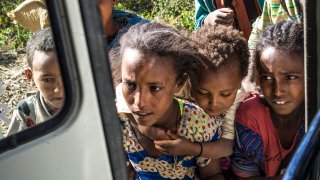The Tigray War May Be One of the Deadliest Conflicts of This Century
The numerous atrocities committed in Ethiopia’s civil war have yet to draw the attention of the international community.
Editor’s Note: The following article is adapted from the introduction to The New Line Institute for Strategy and Policy’s recently published report “Genocide in Tigray: Serious Breaches of International Law and Paths to Accountability” with the permission of the New Lines Institute.
Measured by the estimated number of deaths, the Tigray War in Ethiopia could be the deadliest armed conflict of the twenty-first century and one of the bloodiest since the end of the Cold War. From its outbreak in 2020 to the official ceasefire in 2022, the civil conflict claimed the lives of up to 400,000 soldiers and 300,000 civilians.
Despite the intense human suffering, this “forgotten” war has not garnered the international attention it desperately needs. There is an unfortunate sense in which the world is too ready to move on after its initial efforts. The International Commission of Human Rights Experts on Ethiopia dissolved before concluding its work. The United States, despite recognizing more than half a million deaths in the region and that crimes against humanity and war crimes had been committed there has restored financial and economic assistance to the status quo ante bellum. Similarly, the EU has returned to its $680 million development strategy with the nation despite a lack of accountability for the widespread abuses in the region.
The consequence has been that international efforts to verify serious breaches of international law have not been followed through or adequately supported. Victims will carry with them scarring and abuse from a conflict that, despite an apparent cessation of hostilities in 2022, did not result in a stable peace. Innocent lives continue to be lost, and many millions continue to face food insecurity resulting from military campaigns. More time must be given not only to investigate and, as needed, provide accountability for the blockade on humanitarian aid that contributed to the deaths of hundreds of thousands of Tigrayans but also to investigate and provide accountability for the widely-reported mass murder, rape, forced displacement, physical abuse, and torture which took place, as well as the targeting of key civilian infrastructure such as the healthcare system.
The New Lines Institute for Strategy and Policy today published a new groundbreaking report on “Genocide in Tigray: Serious Breaches of International Law and Paths to Accountability” with an aim to fill this vacuum by informing stakeholders of the sheer scale and variety of the alleged criminal conduct; providing a legal analysis of the relevant allegations through the particular lens of the Genocide Convention and describing pathways to accountability which should be adopted, including measures at both the national and international levels.
The report was prepared by a group of international law professionals with expertise in fields including international human rights law and international criminal law. While several other reports have reached similar conclusions concerning some of the key factual allegations, the New Lines Institute report is the first to relate these allegations directly to the Genocide Convention and to call for action accordingly.
While the report finds that there is a reasonable basis to believe that all sides committed war crimes in the course of the conflict, Ethiopian and allied forces—specifically, members of the Ethiopian National Defense Force, the Eritrean Defense Forces, and the Amhara Special Forces, among other groups—also appear to have committed crimes against humanity against Tigrayans, as well as acts of genocide.
These acts of genocide include killings, the infliction of serious bodily and mental harm, intentional measures to prevent births, and the deliberate infliction of conditions of life calculated to bring about the destruction of Tigrayans. The report finds, furthermore, that certain individuals also appear to have made statements amounting to direct and public incitement to commit genocide.
Irrespective of whether this apparent conduct by the Ethiopian and allied forces was committed as part of a plan or whether it was supported at senior levels, Ethiopia was obliged as a state party to the Genocide Convention to take effective action to prevent the commission of genocidal acts and to punish such acts if they occurred.
As a consequence, the international community is compelled to act, including potentially by states instituting proceedings before the International Court of Justice under Article IX of the Genocide Convention. The international community should also take steps to secure an international, impartial, and independent criminal investigation, exercise universal jurisdiction where practicable, and thus ensure that justice for the numerous human rights violations is finally done in Tigray.
Dr. Azeem Ibrahim OBE is the Senior Director of Special Initiatives at the New Lines Institute for Strategy and Policy in Washington, DC. The New Lines Institute report “Genocide in Tigray: Serious Breaches of International Law and Paths to Accountability” can be accessed here.
Image: Rudi Ernst / Shutterstock.com

